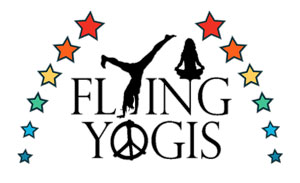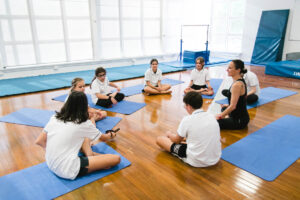
Flying Yogis
Yoga & Acrobatics for Kids
Week 3 OUTLINE
HERE IS A GUIDE ON HOW TO STRUCTURE YOUR YAMAS LESSON.
CLASS INTRO (15 MINS)
ACTIVITY 1: LINKED TO SOCIAL TOPIC (15 MINS)
ACTIVITY 2: LINKED TO PHYSICAL TOPIC (15 MINS)
CONCLUSION AND MEDITATION (10 MINS)
THIS WEEKS SOCIAL FOCUS IS : Emotion recognition and Expression
THIS WEEKS PHYSICAL FOCUS IS : Agility and Resilience
1. CLASS INTRO - 15 MINS
A. WELCOME CLASS AND INTRO TO TOPIC- 5 mins
GET THE GROUP SEATED AND FOCUSED, INTRODUCE YOURSELF AND SESSION RULES.
UNDERSTANDING: Emotion recognition and Expression
Recognising how we feel and why we are feeling that way is an important coping tool and helps us build relationships. Emotions can be expressed verbally (through words and tone of voice) or by using nonverbal communication, including the use of body language or facial expressions
Questions to start discussions:
How do I feel right now? How might others feel? Why am I or they feeling that way? How do I know when I or others are feeling a certain way? Is there a way to change how I feel once I have recognised this?
UNDERSTANDING AGILITY AND RESILIENCE
Resilience: is the ability to withstand adversity and bounce back from difficult life events. If you face a challenge you shouldn’t give up, try again and adapt.
Agility: is our ability to move quickly and easily. You can also have mental agility to think and understand quickly.
Improving our Agility and Resilience can help us to overcome any challenge life throws at us.
Questions to start discussions:
n our busy lives with many unseen challenges how can resilience and quick thinking help us?
B. COMPLETE JOURNAL OR WORKSHEET- 5 mins
NO LONGER THAN 5 MINS
Stick in and complete necessary worksheet, write thoughts and topic definition (worksheet will say the weeks social skill and the weeks physical skill)

C. Quick 5 pose stretch/warm up:- 5 mins
NO LONGER THAN 5 MINS
(5 new poses or stretches each week) Salutes if desired
2. SOCIAL TOPIC GAME/ ACTIVITY (15 min)
Topic- Emotion Recognition and Expression
There are 3 activity options below, select the one best suited to your age group. If you have spare time feel free to complete 2+ activities with your group.
A. GAME #1 - Emotions "Who am I"
What you need: Printed and laminated emotion prompts, (Or tear up paper and write them when your are there)
Instructions: Each child gets one prompt that is stuck to their forehead, like the game “who am I” the student must ask peers questions to guess which emotion they are
Lesson Learnt: This game helps students to recognise particular features of certain emotions so they can recognise and address these emotions as they feel them in real life
B. GAME #2 JENGA Emotions
What you need: Jenga Blocks – each Jenga block is coloured and has a prompt for an emotion (colour, word, description, image, situation)
Instructions:
1. Describe how all the coloured jenga blocks are all of our emotions balancing within us.
2. Each child must pull out 1 jenga block and read out/describe the prompt. The group then discusses other ways to describe that emotion, when and what it feels like etc..
Then place the emotion back on top of the jenga pile.
** Block can have story prompts, guess how the character may feel **
Lesson Learnt:
Describe how our emotions are just momentary, Sometimes they feel stronger as we are holding and feeling them, but just as in the jenga game, we put back the piece and move to the next emotion, like in life.
C. GAME #3 - Pin the tail on the "emotions"
What you need: Large printed colour wheel of emotions vocabulary (blindfold if can)
Instructions:
1. A child is blindfolded and spins 3 times to then touch and point to 1 part of the wheel
2. Various challenges can be given from this point-
Other peers must explain the word without saying it…
Synonyms of the word must be given for the child to guess..
The blindfolded child opens their eyes to read the answer but doesn’t tell the class, as the class must now guess what they landed on…
Be creative, not all children get a turn, its about the discussions that are had.

Video guides below if available
3. PHYSICAL SKILL- GAME/ ACTIVITY (15 min)
Topic- Agility and Resilience
There are 3 activity options below, select the one best suited to your age group. If you have spare time feel free to complete 2+ activities with your group.
A. CHALLENGE #1 Challenging yoga poses...
Discussion throughout: After many tries and not giving up you may think of new tips to help you. Be resilient, keep practising and you’ll get it!
Poses to try:
1.Crow pose, pretzel, turtle pose, dragonfly, eagle…
2. Show balancing twist challenge for Older kids (Very hard) but worth a playful try to discuss how sometimes in life we will be very challenged, but it’s worth trying and being resilient, if you practice enough eventually you’ll get it… Tell them to practice all week and notice the change. Video below:
B. GAME #2 - Running bean bag Naughts and Crosses-
Discussion throughout: In this team game you must be agile and quick to win, and your entire team must be resilient to change your game plan in the blink of an eye!
Equipment: (9 hoops, or drawn board with chalk on the floor) 5:4 coloured beanbags or coloured bibs)
Description:
On go, the first person from each team will run down to the tic tac toe board and place their marker in one of the hula hoops. After they place the marker, they will race back to their line to high five the next student in line. The next student will then place their marker in an open hoop. The first team to fill a line with 3 in a row wins
C. GAME #3 - Some Partner Acro Challenges
Discussion throughout: Some of these partner acro challenges will be difficult and you have to be agile with your bodies and resilient with your partner or teammates to make each shape work!
Examples of some partner poses: Double dog, Try to create a whole chain of connected double dogs… Double boat, double plank, Use other FY. resources to think of more partner challenges
4. ENDING DISCUSSION & MEDITATION (10 min)
BRING THE GROUP BACK INTO A CENTRAL CIRCLE, DISCUSS ANY LAST IDEAS OR LEARNINGS FROM THE GAMES AND ANSWER ANY LAST QUESTIONS
Ask the kids what they have learnt and how they will carry these skills into the rest of their week
FINISH WITH A NEW MEDITATION EACH WEEK

Encouraging Affirmations READ SCRIPT AS CHILDREN LAY STILL AND CALM (add more if you can think of some)
Namaste. This is a great practice to calm overwhelmed and anxious minds. You can do it between intense study sessions. You can do it before bed; you can do it before you go to school…
(a) slow down your breath. One hand to the belly – one to the chest. (box breath)
(b) set affirmations:
– My mind is open to learning all the subjects I take at school
– I learn very easily
– I easily remember what i read and study. It’s all there in my brain.
– I understand my courses inside and out
– i will achieve a great result in the exams
– I achieve anything i put my mind to
– nothing can get in my way
– I am consistent with my study in all areas of schoolwork
– My brain is absorbing all the information I study. I know how to access this information on the day of the exam
– failures in the past don’t get me down. I am grateful for them and have learned so much from them.
– I’ve got this. I’m going to nail these exams
5. GAME SUGGESTIONS FOR IF YOU HAVE EXTRA TIME
© Copyright - Flying Yogis